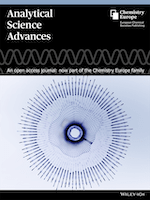
Analytical Science Advances
Scope & Guideline
Exploring Innovative Methodologies in Analytical Science
Introduction
Aims and Scopes
- Metabolomics and Lipidomics:
The journal emphasizes research in metabolomics and lipidomics, particularly in the context of health, disease diagnostics, and food safety. This includes both targeted and untargeted approaches to metabolite profiling. - Mass Spectrometry Techniques:
There is a strong focus on mass spectrometry applications, including advancements in quantitative mass spectrometry, ambient ionization techniques, and the development of new mass spectrometric methods for complex sample analysis. - Analytical Chemistry Innovations:
The journal highlights innovative analytical chemistry techniques such as chromatography, NMR spectroscopy, and Raman spectroscopy, exploring their applications in various fields including environmental science, pharmaceuticals, and food safety. - Nanotechnology in Analysis:
Research involving nanotechnology, especially the application of nanomaterials in sensors and analytical methods, is a core area of focus, showcasing the intersection of nanotechnology and analytical science. - Food and Environmental Safety:
A commitment to food safety and environmental monitoring is evident, with studies focused on contamination detection, biopolymer-based packaging, and the effects of environmental pollutants. - Emerging Analytical Technologies:
The journal is at the forefront of reporting on emerging analytical technologies, including machine learning applications in data analysis and the integration of artificial intelligence in analytical methods.
Trending and Emerging
- Bioactive Compounds and Natural Products:
There is a growing interest in the analysis of bioactive compounds derived from natural sources, such as plants and microorganisms, highlighting their potential applications in health and food safety. - Food Safety and Quality Control:
Emerging methodologies for ensuring food safety, including the use of microfluidics and intelligent packaging, indicate a significant trend towards enhancing food quality and safety through innovative analytical approaches. - Health-Related Metabolomics:
There is an increasing focus on metabolomics in the context of health applications, particularly in understanding disease mechanisms and developing diagnostic tools. - Environmental Analysis and Sustainability:
Research addressing environmental pollutants and sustainability practices is gaining importance, as scientists seek to develop methods for monitoring and mitigating environmental impacts. - Integration of AI and Machine Learning:
The application of artificial intelligence and machine learning in analytical methods is on the rise, reflecting a trend towards utilizing advanced computational techniques to enhance data analysis and interpretation. - Microbial and Biopolymer Applications:
There is a notable increase in research involving microbial applications and biopolymers for analytical purposes, indicating a shift towards sustainable and eco-friendly analytical solutions.
Declining or Waning
- Traditional Chromatographic Techniques:
There appears to be a decreasing emphasis on conventional chromatographic methods in favor of more innovative and efficient techniques. This shift indicates a move towards high-throughput and multi-dimensional approaches. - Basic Analytical Methodologies:
Studies focusing solely on basic or traditional analytical methodologies, without significant innovation or application, are becoming less frequent as the journal prioritizes cutting-edge research and applications. - In-depth Reviews on Historical Techniques:
There has been a noticeable decline in comprehensive reviews of older analytical techniques, suggesting that the journal is moving towards more contemporary and applicable research findings. - Generalized Toxicological Studies:
Research that addresses toxicological analyses in a generalized manner, without specific applications or innovative methodologies, is less prominent, indicating a preference for targeted, application-driven studies. - Single-Discipline Focus:
Papers that focus on a single discipline without interdisciplinary connections are decreasing, reflecting a trend towards more integrative approaches that combine multiple fields of study.
Similar Journals
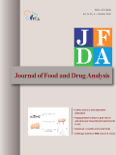
JOURNAL OF FOOD AND DRUG ANALYSIS
Innovating Insights for a Healthier TomorrowJOURNAL OF FOOD AND DRUG ANALYSIS, an esteemed publication in the realms of Food Science and Pharmacology, is published by DIGITAL COMMONS BEPRESS. With an impactful commitment to open access since 2013, this journal facilitates the dissemination of critical research findings, making them readily available to a global audience. Boasting a commendable Q2 ranking in both Food Science and Pharmacology, the journal occupies a prominent position in its respective categories, reflecting its quality and relevance in the field. Established in 1994, the journal has successfully converged its focus to encompass a wide range of topics related to the analysis of food and drugs, thereby providing valuable insights to researchers, practitioners, and students alike. With its indexed indicators in Scopus showcasing a strong performance—ranking #85 among 389 in Food Science and #108 among 313 in Pharmacology—it stands as a crucial platform for the advancement of knowledge and innovation. For those looking to stay abreast of pivotal developments in food safety and drug efficacy, JOURNAL OF FOOD AND DRUG ANALYSIS is an indispensable resource.

Food Analytical Methods
Innovating analytical approaches for a sustainable food future.Food Analytical Methods, published by Springer, is an esteemed journal dedicated to the innovative field of analytical methodologies within the food sciences. With an ISSN of 1936-9751 and E-ISSN of 1936-976X, this journal serves as a pivotal platform for researchers and professionals to exchange insights, methodologies, and findings related to food quality analysis, safety measures, and innovative technologies in food science. As of 2023, Food Analytical Methods boasts impressive Scopus rankings, including Q2 in Analytical Chemistry and Food Science, positioning it among the top journals in its category. The journal's commitment to enhancing food safety and quality through rigorous research underscores its importance in both academic and industrial applications. Although it does not currently operate under an open-access model, it provides exceptional value through its rigorous peer-review process and comprehensive publication standards, further inviting contributions from both established and emerging scientists in the field. With coverage spanning from 2008 to 2024, this journal continues to address critical research areas, thereby shaping the future of food analytics.
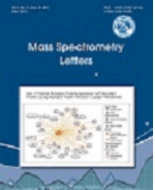
Mass Spectrometry Letters
Transforming Research into Accessible Knowledge.Mass Spectrometry Letters is a pioneering open-access journal published by the Korean Society for Mass Spectrometry, specializing in the diverse fields of analytical chemistry, biochemistry, and spectroscopy. Established in 2010, this journal aims to disseminate groundbreaking research and advancements in mass spectrometry and its applications across various scientific domains. Though currently categorized in the Q4 quartile in key analytical fields, Mass Spectrometry Letters serves as an essential platform for researchers, professionals, and students to share innovative methodologies, emerging trends, and practical applications of mass spectrometry, thus fostering collaboration and advancing knowledge in the scientific community. With a commitment to open access, articles published since 2010 are readily available, enabling widespread distribution and engagement within the international research community. Located in Daejeon, South Korea, and actively converging research through 2024, the journal holds the potential to grow its impact and relevance within the dynamic landscape of mass spectrometry.
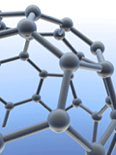
Annual Review of Analytical Chemistry
Exploring the Depths of Analytical TechniquesAnnual Review of Analytical Chemistry, published by Annual Reviews, is a premier journal that serves as a critical resource in the field of analytical chemistry, providing comprehensive and cutting-edge reviews that synthesize recent advancements and pivotal research findings. With an impressive impact factor and ranked Q1 in both Analytical Chemistry and Miscellaneous Medicine, it stands as a leader in disseminating knowledge that spans the intricacies of chemical analysis, enhancing the scientific discourse within the community. Available in both print (ISSN: 1936-1327) and online (E-ISSN: 1936-1335), the journal is accessible to a wide audience, fostering innovation and collaboration among researchers, professionals, and students alike. Its scope includes the converged years from 2008 to 2024, showcasing its commitment to providing relevant and timely insights that impact practice and education in analytical techniques, methodologies, and applications. The Scopus rank of #6 out of 156 in Analytical Chemistry, placing it in the 96th percentile, underscores its significance and the high regard in which it is held. As you explore the journal's offerings, you will find a wealth of knowledge that not only informs but inspires future discoveries in the realm of analytical chemistry.

MICROCHEMICAL JOURNAL
Illuminating the Path of Spectroscopic DiscoveriesMicrochemical Journal, published by Elsevier, stands as a leading scholarly publication in the fields of Analytical Chemistry and Spectroscopy, boasting impressive rankings of Q1 and Q2 in their respective categories for 2023. With an H-index reflecting its substantial impact and relevance, this journal has been a cornerstone of research dissemination since its inception in 1957, and it continues to play a vital role in advancing the methodological and technological innovations within these disciplines. The journal presents peer-reviewed articles that explore a wide array of topics, making it an essential resource for researchers, professionals, and students keen on the latest advancements in microchemical processes and techniques. Although it does not currently offer open access options, its publication through Elsevier ensures a high standard of academic integrity and wide accessibility through various academic institutions. With a strong Scopus ranking—9th in Chemistry Spectroscopy and 22nd in Analytical Chemistry—Microchemical Journal is an indispensable platform for empirical studies, insightful reviews, and pioneering methodologies in the microchemical domain.
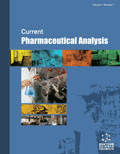
Current Pharmaceutical Analysis
Pioneering Analytical Methodologies for Tomorrow's MedicinesCurrent Pharmaceutical Analysis, published by Bentham Science Publishers Ltd, is a vital resource for professionals and researchers in the fields of Pharmaceutical Science, Biochemistry, and Molecular Medicine. Established in 2006, this peer-reviewed journal aims to provide a platform for the latest advancements and analytical methodologies in pharmaceutical research and drug development. Over the years, it has garnered attention for its rigorous scrutiny and contributions to the landscape of pharmacology, evidenced by its quartile placements in various categories, most notably Q3 in Pharmaceutical Science. Despite its current rankings placing it in the lower quartile in several disciplines, the journal remains an essential venue for both emerging and established researchers seeking to disseminate their findings. With the widespread accessibility of its articles, researchers, professionals, and students can engage with cutting-edge studies to foster innovation in pharmaceutical analysis. For access to the latest research contributions, readers can explore the digital archive and stay updated on pivotal discussions shaping the future of the pharmaceutical sciences.
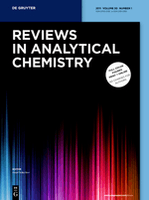
REVIEWS IN ANALYTICAL CHEMISTRY
Navigating the Landscape of Analytical InnovationsREVIEWS IN ANALYTICAL CHEMISTRY, published by De Gruyter Poland Sp. z o.o., serves as a pivotal resource in the field of analytical chemistry, with a notable impact factor indicative of its scholarly significance. As an Open Access journal since 2020, it ensures widespread dissemination of high-quality research articles, facilitating knowledge sharing among researchers, professionals, and students alike. With its origins tracing back to 1980, the journal has adeptly adapted over the years to encompass emerging trends and innovations within analytical methodologies, maintaining its relevance and authority in the discipline. The journal is ranked in the Q2 category of analytical chemistry in 2023 and holds a commendable Scopus rank of #32 out of 156, reflecting its strong performance and the quality of the studies published. Researchers looking for cutting-edge reviews and insights will find this journal an invaluable platform for advancing their knowledge and research in analytical chemistry.
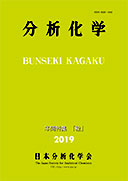
BUNSEKI KAGAKU
Advancing the Frontiers of Analytical ChemistryBUNSEKI KAGAKU, published by the Japan Society Analytical Chemistry, is a reputable journal dedicated to the field of analytical chemistry. With an ISSN of 0525-1931, this journal has been a crucial outlet for scholarly communication since its inception in 1952, converging its publication years from 1954 to 1957 and from 1959 to 2024. Although it holds a Q4 category ranking in the most recent 2023 quartiles of analytical chemistry and ranks 153/156 in Scopus, it continues to serve as a platform for quality research, fostering advancements in the field. BUNSEKI KAGAKU is based in Tokyo, Japan, and emphasizes the critical importance of analytical techniques in scientific inquiry. With a commitment to professionalism and rigor, the journal provides a vital resource for researchers, students, and professionals seeking to explore innovative methodologies and contribute to the ongoing dialogue in analytical chemistry.

SPECTROSCOPY
Bridging Disciplines through Spectroscopic ExcellenceSPECTROSCOPY is a vital peer-reviewed journal published by MJH Life Sciences, dedicated to advancing the field of spectroscopy and its applications across various disciplines including analytical chemistry, atomic and molecular physics, and optics. Established with a vision to disseminate cutting-edge research, the journal has a broad scope that encompasses the latest developments, methodologies, and technologies in spectroscopy. Although positioned in the Q4 quartiles for its categories as of 2023, it remains an important resource for researchers and students alike, providing insights into emerging trends and challenges in the field. Issues are published regularly, facilitating knowledge exchange and collaboration among professionals. With access options available in traditional formats, SPECTROSCOPY strives to reach a diverse audience, underscoring its relevance and necessity in today’s ever-evolving scientific landscape. For those in pursuit of innovative solutions and comprehensive analyses in spectroscopy, this journal serves as an indispensable platform.
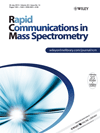
RAPID COMMUNICATIONS IN MASS SPECTROMETRY
Elevating standards in analytical and organic chemistry.RAPID COMMUNICATIONS IN MASS SPECTROMETRY is a leading journal published by Wiley, focusing on the rapidly evolving field of mass spectrometry and its applications across various domains, including analytical, organic, and spectroscopy chemistry. With its ISSN 0951-4198 and an E-ISSN of 1097-0231, the journal has firmly established itself as a reputable source of innovative research since its inception in 1987, and is set to continue until 2024. As evidenced by its 2023 Scopus rankings, the journal occupies a solid position in the realms of analytical chemistry (Q3), organic chemistry (Q3), and spectroscopy (Q3), reflecting its impact among a diverse audience of researchers and professionals. Although it is not an open-access publication, the findings shared within its pages are pivotal for advancing knowledge and practical applications in mass spectrometry, making it an essential resource for students and experts aiming to stay abreast of the latest scientific developments.